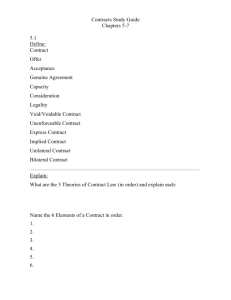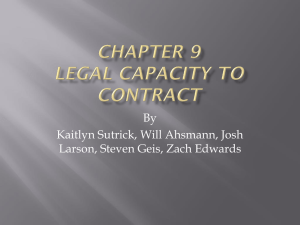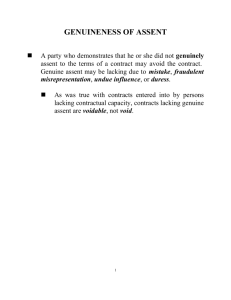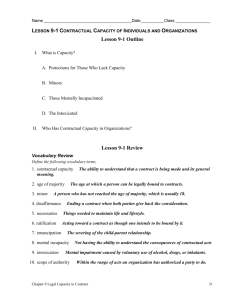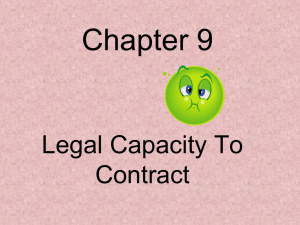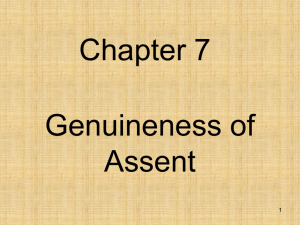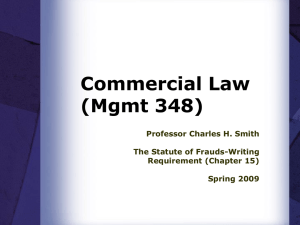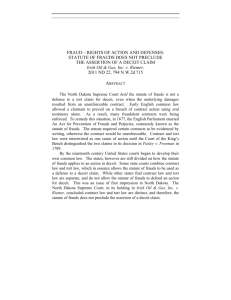Chapter Eight—Contracts: Capacity, Legality, Assent, and Form
advertisement
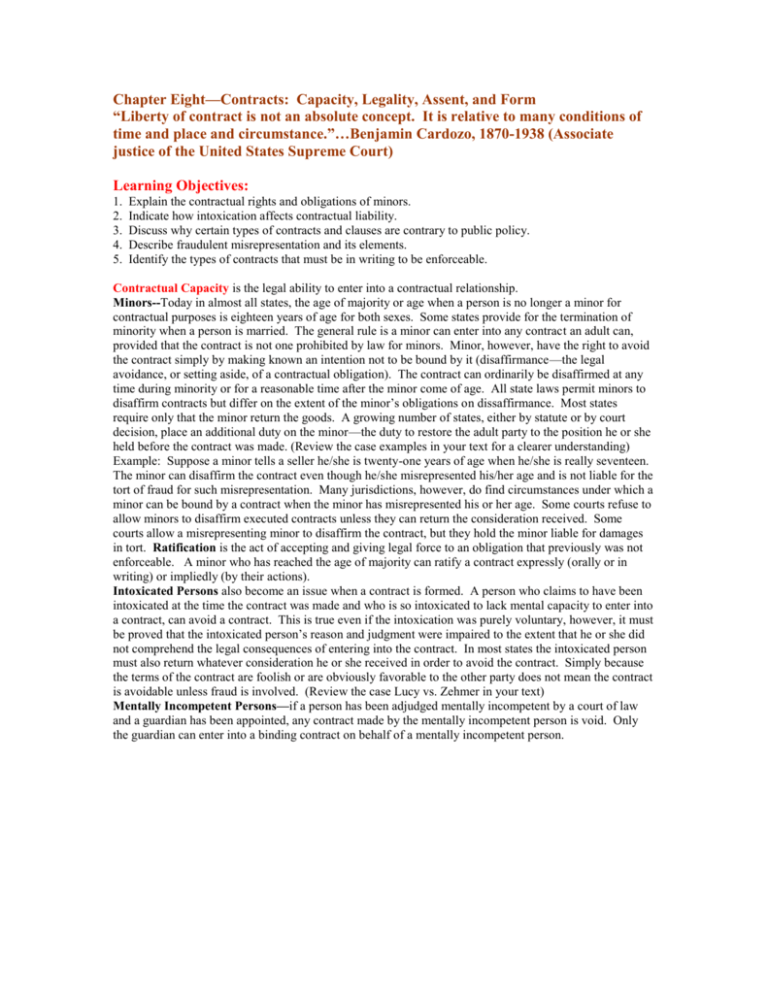
Chapter Eight—Contracts: Capacity, Legality, Assent, and Form “Liberty of contract is not an absolute concept. It is relative to many conditions of time and place and circumstance.”…Benjamin Cardozo, 1870-1938 (Associate justice of the United States Supreme Court) Learning Objectives: 1. 2. 3. 4. 5. Explain the contractual rights and obligations of minors. Indicate how intoxication affects contractual liability. Discuss why certain types of contracts and clauses are contrary to public policy. Describe fraudulent misrepresentation and its elements. Identify the types of contracts that must be in writing to be enforceable. Contractual Capacity is the legal ability to enter into a contractual relationship. Minors--Today in almost all states, the age of majority or age when a person is no longer a minor for contractual purposes is eighteen years of age for both sexes. Some states provide for the termination of minority when a person is married. The general rule is a minor can enter into any contract an adult can, provided that the contract is not one prohibited by law for minors. Minor, however, have the right to avoid the contract simply by making known an intention not to be bound by it (disaffirmance—the legal avoidance, or setting aside, of a contractual obligation). The contract can ordinarily be disaffirmed at any time during minority or for a reasonable time after the minor come of age. All state laws permit minors to disaffirm contracts but differ on the extent of the minor’s obligations on dissaffirmance. Most states require only that the minor return the goods. A growing number of states, either by statute or by court decision, place an additional duty on the minor—the duty to restore the adult party to the position he or she held before the contract was made. (Review the case examples in your text for a clearer understanding) Example: Suppose a minor tells a seller he/she is twenty-one years of age when he/she is really seventeen. The minor can disaffirm the contract even though he/she misrepresented his/her age and is not liable for the tort of fraud for such misrepresentation. Many jurisdictions, however, do find circumstances under which a minor can be bound by a contract when the minor has misrepresented his or her age. Some courts refuse to allow minors to disaffirm executed contracts unless they can return the consideration received. Some courts allow a misrepresenting minor to disaffirm the contract, but they hold the minor liable for damages in tort. Ratification is the act of accepting and giving legal force to an obligation that previously was not enforceable. A minor who has reached the age of majority can ratify a contract expressly (orally or in writing) or impliedly (by their actions). Intoxicated Persons also become an issue when a contract is formed. A person who claims to have been intoxicated at the time the contract was made and who is so intoxicated to lack mental capacity to enter into a contract, can avoid a contract. This is true even if the intoxication was purely voluntary, however, it must be proved that the intoxicated person’s reason and judgment were impaired to the extent that he or she did not comprehend the legal consequences of entering into the contract. In most states the intoxicated person must also return whatever consideration he or she received in order to avoid the contract. Simply because the terms of the contract are foolish or are obviously favorable to the other party does not mean the contract is avoidable unless fraud is involved. (Review the case Lucy vs. Zehmer in your text) Mentally Incompetent Persons—if a person has been adjudged mentally incompetent by a court of law and a guardian has been appointed, any contract made by the mentally incompetent person is void. Only the guardian can enter into a binding contract on behalf of a mentally incompetent person. Legality—for a contract to be valid and enforceable, it must be formed for a legal purpose. Almost all states have a statute that sets the maximum rate of interest than can be charged for different types of transactions. A lender who makes a loan at an interest rate above the lawful maximum commits usury. This maximum interest rate can vary from state to state. In general, gambling contracts are illegal and thus void. All states have statutes that regulate gambling (any scheme that involves the distribution of property by chance among persons who have paid valuable consideration for the opportunity or chance to receive the property). Sabbath (Sunday) Laws prohibit the formation or performance of certain contracts on a Sunday. These laws, which date back to colonial times, are often called blue laws. Sunday laws are often not enforced. Licensing Statutes require members of certain professions to obtain a license that allows them to practice (physicians, lawyers, real estate brokers, architects, electricians, stockbrokers, etc.) Some contracts are not enforceable because of the negative impact they would have on society. These contracts are said to be contrary to public policy such as “baby selling” or a contract that prohibits marriage. Contracts in restraint of trade usually adversely affect the public policy that favors competition in the economy and therefore violate one or more federal or state statutes. Covenants not to compete are often contained in contracts concerning the sale of an ongoing business. If the contract terms are reasonable in terms of time and geographic area the contract is a valid contract. The contract is considered void only if the terms of time and geographic area are deemed unreasonable. A contract or clause that is void on the basis of public policy because one party, as a result of his or her disproportionate bargaining power, is forced to accept the terms that are unfairly burdensome and that unfairly benefit the dominating party is said to be an unconscionable contract or clause. Exculpatory clauses release a contractual party from liability in the event of monetary or physical injury, no matter who is at fault. In general an illegal contract is void: the contract is deemed never to have existed, and the courts will not aid either party. Exceptions to the rule include (1) when one of the parties to a contract is relatively innocent having no knowledge or any reason to know that the contract is illegal, the courts will not enforce the contract but will allow the parties to return to their original positions; (2) When a statute protects a certain class of people, a member of that class can enforce an illegal contract even though the other party cannot; (3) if the illegal part of a bargain has not yet been performed, the party tendering performance can withdraw form the bargain and recover the performance or its value; (4) whenever a plaintiff has been induced to enter into an illegal bargain as a result of fraud, duress, or undue influence, he or she can either enforce the contract or recover for its value. Genuineness of Assent may be lacking because of mistake, fraudulent misrepresentation, undue influence, or duress. We all make mistakes and in certain circumstances, contract law allows a contract to be avoided on the basis of mistake. Courts have considerable difficulty in specifying the circumstances that justify allowing a mistake to invalidate a contract. Generally courts distinguish between mistakes as to judgment of market value or conditions and mistakes as to fact. Only mistakes as to fact normally have legal significance. (Review mistakes as to fact in your text including unilateral mistakes and mutual mistakes. Fraudulent Misrepresentation—although fraud is a tort, the presence of fraud also affects the genuineness of the innocent party’s consent to a contract. When an innocent party consents to a contract with fraudulent terms, the contract usually can be avoided. Typically there are three elements of fraud: (1) a misrepresentation of a material fact must occur, (2) there must be an intent to deceive, and (3) the innocent party must justifiably rely on the misrepresentation. To collect damages a party must have been injured as a result of the misrepresentation. (Review the examples in your text for a clearer understanding) Undue Influence arises from relationships in which one party can greatly influence another party and thus overcome that party’s free will. Minors and elderly people are often under the influence of guardians. Duress is the forcing of a party to enter into a contract because of the fear created by threats. Blackmail, extortion to induce consent to a contract constitutes duress. Duress is both a defense to the enforcement of a contract and a ground for rescission or cancellation of a contract. The Statute of Frauds—Requirements of a Writing Although the statutes vary slightly from state to state, the following types of contracts are normally required to be in writing or evidenced by a written memorandum: 1. Contracts involving interest in land. 2. Contracts that cannot by their terms be performed within one year form the date of formation. 3. Collateral contracts, such as promises to answer for the debt or duty of another. 4. Promises made in consideration of marriage. 5. Contracts for the sale of goods priced at $500 or more. (Review the Landmark in Law—The Statute of Frauds in your text. Be sure to know the types of contracts that must be in writing for your next exam. Review the detailed explanations and examples for each in your text.) The Statute of Frauds—Sufficiency of the Writing A written contract, a written memorandum written in evidence of the oral contract will satisfy the requirements of the Statute of Frauds. The signature can be anywhere in the writing. A writing can consist of any confirmation, invoice, sales slip, check, or fax or any combination of these. Several documents may form a single contract if they are physically attached or in the same envelope. Key Terms for Chapter Eight Adhesion contract Blue law Collateral promise Contractual capacity Dissaffirmance Exculpatory clause Ratification Reformation Statute of Frauds Unconscionable contract or clause Usury (Study any terms in dark print in the summary)
